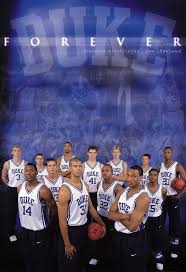“The Shot That Still Haunts Durham: Duke’s 1999 Collapse That History Won’t Let Go”
In the hallowed halls of Cameron Indoor Stadium, where banners wave like sacred scrolls and legends are born under the glow of March Madness, Duke basketball stands as a symbol of excellence, tradition, and near-mythic dominance. For decades, the Blue Devils have defined what it means to win with brilliance and grace. But for all the moments of triumph — buzzer-beaters, confetti showers, and title-clinching embraces — there remains one night so piercing in its heartbreak, so staggering in its finality, that it refuses to fade. It’s not just a memory. It’s a wound. A night when the best Duke team ever assembled was on the cusp of immortality — and fell.
April 5, 1999 — the National Championship Game against UConn.
The Duke Blue Devils were not just expected to win — they were supposed to dominate. But when the buzzer sounded, the scoreboard told a different story:
UConn 77, Duke 74.
And with that, what could have been the greatest Duke team ever walked off the floor in disbelief, leaving behind a story that would haunt Durham for years to come.

Let’s not understate it: the 1998–99 Duke Blue Devils were a juggernaut.
Record: 37–1 heading into the title game.
Roster: A dream lineup with Elton Brand, Shane Battier, Trajan Langdon, William Avery, and Corey Maggette — all future NBA players.
Coach: Mike Krzyzewski, already a legend, going for his third title.
They had won 32 straight games entering the championship. Most of their victories weren’t close. They were steamrolling teams — a blend of youth and talent, with a depth no one could match. Historic in dominance, poetic in execution — and expected to cruise past UConn.
But basketball, like life, doesn’t always follow the script.
The UConn Upset That Shook the World
Duke entered the game as 9.5-point favorites — a rare number for a title matchup.
But Jim Calhoun’s UConn Huskies had other plans. Led by guard Richard “Rip” Hamilton, point man Khalid El-Amin, and a fearless defensive mindset, UConn came out swinging.
Duke struggled to match the intensity. Elton Brand had 15 points and 13 boards, but UConn’s defensive schemes disrupted Duke’s rhythm. Langdon, the senior leader, was hounded all night. Yet Duke still had a shot.
With seconds left and Duke down 75–74, the ball was in Trajan Langdon’s hands. This was the moment for redemption.
He slipped.
Fell to the floor.
Turned the ball over.
The game — and Duke’s destiny — was gone.
A Loss That Changed the Narrative
The heartbreak was more than a missed shot or a single turnover. It was the collapse of an entire season’s worth of destiny. Duke wasn’t just beaten — they were stunned on the sport’s biggest stage.
To this day, some fans say it was the most painful loss of Mike Krzyzewski’s entire career. Others argue that the 1999 squad, despite its incredible power, was too young — or too tight in big moments.
Coach K, ever the motivator, never publicly blamed his players. But that game changed Duke’s narrative. It proved invincibility was an illusion, even for the mighty Blue Devils.
Why It Still Haunts Duke
Unlike Duke’s championship years (1991, 1992, 2001, 2010, 2015), 1999 lingers because it was supposed to be the sure thing. The slam dunk. The dynasty.
Instead, it became a cautionary tale.
Elton Brand left for the NBA, followed by Maggette and Avery.
That core never played together again.
It took Duke two more years to return to glory in 2001.
But even that championship couldn’t fully erase the 1999 ghosts. Every March, when old highlights resurface, there’s one that Duke fans quietly skip: Langdon falling at the top of the key.
It’s not fair. It’s sports.
But it’s real.
The Loss That Made Them Human
Perhaps that’s the lasting legacy of 1999 — not as a failure, but as a reminder.
That even the greatest teams stumble.
That greatness is never guaranteed.
And that sometimes, it’s the losses — not the wins — that shape who we become.
For Duke basketball, the banners still hang. The legends still return. But the loss to UConn in 1999 remains the one they can’t forget — and maybe never should.





























